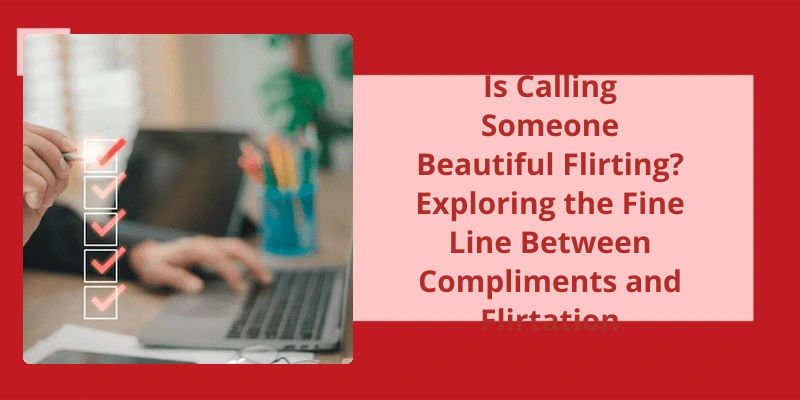The art of flirting can be quite complex and nuanced, with a myriad of subtle gestures and verbal cues used to convey attraction and interest. One such gesture that’s often debated is the act of calling someone beautiful. While some may argue that it’s a harmless compliment, others see it as outright flirting. But the question remains – is calling someone beautiful really flirting, or is it simply a benign remark made in passing? The answer, as with many things related to human interaction, is that it depends on the context and the intent behind the words. So let's delve deeper into the topic and explore the intricacies of calling someone beautiful in the realm of romantic and platonic relationships.
Are Compliments a Form of Flirting?
Compliments are a way of expressing appreciation for someones qualities or actions. While some compliments can be part of flirting, not all compliments are intended to signify romantic interest. If someone thinks they’re owed something for a compliment, thats no longer a genuine compliment, but rather an attempt to manipulate another person.
However, the same compliment given by a colleague or a friend might not be interpreted as flirting.
It’s essential to consider the context, the relationship between the giver and the receiver, and the intentions behind the compliment.
All in all, compliments can be a powerful tool in social interactions. If used appropriately, they can uplift someones mood, create positive connections, and foster healthy relationships. However, it’s important to recognize the boundary between sincere compliments and manipulative behavior. A compliment should never be used to coerce or influence someone for personal gain. When in doubt, it’s best to err on the side of caution and treat others with respect and kindness.
The Psychology Behind Compliments: Understanding the Impact on Self-Esteem, Confidence, and Mental Health.
This topic explores how compliments affect our self-esteem, confidence, and mental health. It delves into the psychological mechanisms behind why compliments are important and how they can positively impact our well-being.
As social beings, we interact with others in various ways. And sometimes, our interactions with someone we find attractive can be misinterpreted or confused. One such instance is when we flirt or praise someone. While some may argue that both are forms of complimenting, there’s a subtle difference between the two. It’s worth understanding what sets them apart to avoid any unintentional misunderstandings.
What Is the Difference Between Flirting and Praising?
Flirting and praising are two different approaches that people use to express their feelings towards someone. Flirting involves making comments that are laden with sexual overtones, gestures or teasing implications that are aimed at attracting someones attention. In contrast, praising someone is a way of expressing appreciation for a persons qualities or achievements. This can be done without hinting at romance or sex, and it’s a way of acknowledging someones accomplishments, hard work, or unique characteristics.
This may include compliments about physical appearance, suggestive comments, or innuendos that are meant to create an air of sexual tension. Flirting can be a fun and playful way to interact with someone, but it can also be inappropriate if it’s inappropriate or unwanted by the other person.
This can be done through congratulating them for their achievements, acknowledging their hard work, or by simply complimenting them on a specific skill or ability. It’s a way of recognizing the good in someone and showing appreciation for their contributions, without implying any romantic or sexual interest.
This distinction is important because it helps avoid misunderstanding or confusion.
Knowing these differences can help people interact more effectively in different social and professional situations, without risking damage to their relationships or reputations.
The Psychological Differences Between Flirting and Praising and Their Effects on Self-Esteem
This topic explores the different ways in which people compliment others, whether it be through flirting or praising, and how these actions can impact someone’s self-esteem and confidence levels. By examining the psychological differences between these two actions, we can better understand the effects they’ve on individuals and how they can shape our interpersonal relationships.
However, there may be other reasons why a man would call you beautiful in a text, and it’s important to consider the context of the conversation before jumping to conclusions.
When a Guy Calls You Beautiful in a Text?
It’s a pretty straightforward compliment that men use when they want to express their admiration for a woman. They might also use other adjectives like gorgeous, stunning, or even cute depending on the context and their level of attraction towards you.
However, calling you beautiful in a text might also be a way for a man to show his interest in you beyond your physical appearance. It could be a way for him to initiate a conversation or make an effort to get to know you better. In this case, the compliment isn’t just about your looks but also about your personality, intelligence, or any other qualities that he might find attractive.
Moreover, receiving a text that says you’re beautiful can feel both flattering and overwhelming. While compliments can boost our self-esteem, they can also create pressure to maintain a certain image or meet someones expectations. It’s essential to remember that your worth isn’t defined by your looks or what others think of you. You’re beautiful and valuable in your own way, regardless of what anyone says.
You can thank him for the compliment and move on with the conversation without feeling obliged to return the favor. Alternatively, you can take the opportunity to set clear boundaries and communicate your intentions. For example, if you aren’t interested in pursuing a romantic relationship, you can politely decline his advances and focus on building a friendship instead. Whatever you choose, always prioritize your own feelings and respect yourself first.
Understanding the Context of the Compliment What Does It Mean When a Guy Calls You Beautiful in Different Situations (e.g., in Person, on a Dating App, After a First Date, Etc.)?
This article discusses the different contexts and potential meanings of a guy calling a person beautiful. It explores how the compliment can vary depending on the situation in which it’s given, such as in person or on a dating app, and provides insights into what the compliment could mean in each scenario.
It’s a question that’s been asked time and time again – do girls like it when a guy calls them beautiful? While giving a woman a compliment can be a nice gesture, it’s important to consider the context and potential expectations that may come with it. As we explore this topic further, we’ll dive into the nuances of compliment-giving and what women truly think about being called beautiful.
Do Girls Like It When a Guy Calls Them Beautiful?
Complimenting someone is seen as a polite and friendly gesture, but it can also make someone feel uncomfortable or objectified if it isn’t genuine or if it’s given with ulterior motives. When it comes to compliments from men, women are often on guard, as they’ve to be mindful of the potential for the compliment to be a ploy to gain favor or attention. However, when the compliment is genuine and grounded in a mutual attraction, it can be a powerful way to build a connection and show someone that you appreciate them.
For many women, being called beautiful by a man they’re attracted to can be a feel-good moment that boosts their confidence and makes them feel desired. Women aren’t objects to be admired or pursued solely for their physical appearance, and they’re deserving of respect and attention beyond their looks.
It isn’t appropriate to use compliments as a means of catcalling or harassment, and a man should always be aware of how his words and actions are being perceived. Additionally, it’s important for a woman to feel comfortable expressing her own feelings and boundaries, and to communicate with her partner about what’s and isn’t acceptable when it comes to compliments and other expressions of affection.
The Psychology Behind Compliments and Why They Often Hold So Much Weight in Relationships
Compliments are often powerful in building and strengthening relationships because they tap into people’s fundamental need for acceptance, validation, and positive feedback. When we receive compliments, our brain releases dopamine, resulting in feelings of pleasure and reward. This positive reinforcement encourages us to seek out more of the behavior that led to the compliment, creating a cycle of positive reinforcement that builds trust and intimacy. Additionally, compliments can signal admiration and respect, which are key components of healthy relationships.
While telling someone that they’re beautiful can certainly be a kind gesture, there are other ways to express your admiration for someone’s appearance. Focusing on specific details, such as a person’s smile or behavior, can demonstrate a deeper level of appreciation and show that you’ve taken the time to notice what sets them apart. So, the next time you want to compliment someone’s beauty, consider digging a little deeper and highlighting what makes them truly unique.
Do You Tell a Girl She Is Beautiful?
This not only shows that you’re genuinely paying attention to the person youre talking to, but it also allows for a deeper connection to be formed between the two of you. When someone feels seen and appreciated for the little things that make them unique, it can foster a strong sense of trust and intimacy.
At the same time, it’s important to recognize that compliments go beyond just physical appearance. While it may seem natural to focus on a persons looks, there are many other attributes that make someone attractive, and it’s important to acknowledge these as well. For instance, you might tell someone that you admire their intelligence, sense of humor, or kind heart.
In addition to focusing on specific attributes, it’s also helpful to offer compliments that are genuine and heartfelt. This means avoiding empty flattery or generic comments that could apply to anyone. Instead, take the time to really observe and appreciate the person in front of you, and offer a compliment that speaks to their unique qualities.
Ultimately, whether or not to tell a girl shes beautiful will depend on the situation and your relationship with her. If youre just meeting someone for the first time, it may be more appropriate to stick to smaller compliments that are less personal. But if youre in a committed relationship with someone, letting them know that you find them attractive and beautiful can help to strengthen your bond and deepen your connection.
Whatever you decide, the most important thing is to be authentic and sincere. Compliments that come from a place of honesty and vulnerability are always going to be more meaningful than a canned, generic comment. So take the time to really observe and appreciate the people in your life, and let them know how much they mean to you.
It’s no secret that being called beautiful can have a profound impact on one’s sense of self-worth and confidence. However, it’s important to understand that the meaning behind this compliment goes beyond mere physical appearance. In fact, when someone calls you beautiful, it could signify an admiration for who you’re as a person. Let’s take a closer look at what this term really means and how it can affect us.
What Does It Mean When Someone Calls You Beautiful?
It could be that the womans confidence, intelligence, and humor come across as attractive to the man. It could also be that he admires her strength, kindness, and compassion.
However, it’s more commonly understood that when someone calls another person beautiful, they’re typically referring to the external appearance of the person. Society has put a great emphasis on physical appearance, and being beautiful has become a standard of attractiveness.
It can also serve as a form of validation for their efforts to maintain their physical appearance through exercise, self-care, and grooming.
Physical appearance shouldn’t be the sole factor in determining a persons worth or attractiveness. It’s important to appreciate a person for who they’re as a whole, not just for their external appearance.
It could be a compliment on your personality and character or on your external appearance. Regardless of the intention, it should be taken as a positive affirmation and a reminder to appreciate yourself holistically. It’s important to remember that beauty is more than skin deep and that all individuals have unique qualities and strengths that make them beautiful in their own way.
The Impact of Beauty Standards in Different Cultures and Societies
Beauty standards vary widely across different cultures and societies, and have a significant impact on how people perceive themselves and others. While some cultures prioritize thinness, youthfulness, and symmetry, others value physical traits like curves, hairiness, or scars. These standards can affect people’s self-esteem, mental health, and social opportunities, and have been critiqued by some as promoting harmful, unrealistic ideals. Understanding the cultural context of beauty standards can help us appreciate diverse forms of physical beauty and challenge harmful societal norms.
Conclusion
However, it's important to consider the context of the situation and the individual receiving the compliment. Beauty is subjective, and what one person finds attractive may not be the same for another. It's important to appreciate and acknowledge someone's beauty, but it's also important to recognize and value their personality, intelligence, and other qualities beyond just physical appearance.






